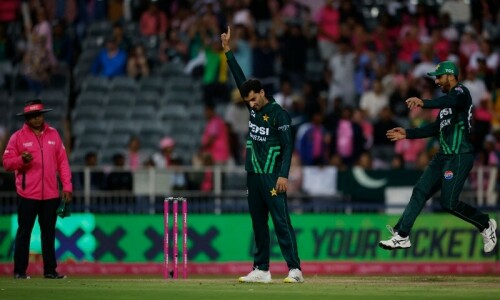EDUCATION in Sindh, as in other parts of the country, continues to be plagued with inefficiency and mismanagement.
The infusion of financial resources and technical expertise is not enough to fix the province’s chronic problems in education.
Drastic changes are needed in the approach to implementing steps identified for improvement.
The Sindh Education Sector Reform Programme (SERP 1) has recently been reviewed by the education department upon the completion of phase one. This initiative was launched in 2006-07 with financial and technical input from the World Bank and the European Commission.
The objectives of SERP are to improve educational outcomes i.e. increase school participation, reduce gender and urban-rural disparities in school participation, increase progression in student learning. Discussions are under way for SERP 2.
Despite claims about its success, the ground realities reveal that no significant breakthrough has been achieved over the past five to six years. Unfortunately, in all discussions on how to overcome the educational challenge, there is overemphasis on the operational and technical aspects — resultantly, there is little debate on the impact or usefulness of such initiatives.
Whatever concerns are enunciated the fact remains that the deteriorating standard of education in the province continues, and no sincere effort is being made by any quarter to stem the crisis as there is the fear of losing lucrative consultancies, jobs for relatives and friends and various financial benefits. Given this situation, it is small wonder that we always find the same people at the helm of affairs whenever a new project is started, even if these people have contributed to the failure of previous programmes.
According to the Sindh Education Management Information System (SEMIS), girls’ enrolment at the primary level increased by a mere two and half per cent from 2006 to 2010; the number of primary schools for girls has decreased from 7,452 to 7,112. The education department should be asked to explain this.
Other figures related to girls’ schools also represent a depressing scenario. Only 25 per cent of schools have electricity, 60 per cent have toilets, 47 per cent have drinking water, 63 per cent have boundary walls and 23 per cent have playgrounds.
Libraries and science labs are almost non-existent. There is a high risk of dropouts in these poorly equipped schools.
In addition, there is an urgent need to renovate 6,847 schools (boys, girls and coeducational) including primary, middle, secondary and higher secondary schools which have been damaged by the floods, the rains and the influx of IDPs. Natural disasters have created additional challenges.
Economies anywhere in the world need sophisticated workforces equipped with the relevant knowledge and skills that only a secondary education can provide. Unfortunately, Sindh’s education system is entirely focused on primary education. Out of a total of 48,914 schools there are 44,522 primary schools. The system doesn’t have the capacity to accommodate students beyond the level of primary education.
A semi-educated population will be unable to bring about the required socioeconomic changes in their lives let alone at a societal level. The government must give serious thought to the expansion of the network of secondary schools, while ensuring major improvements in the existing ones.
A few years ago, a renowned international donor agency funded a $90m project aimed at improving secondary education across Sindh, Balochistan, Fata and Islamabad. Sadly, it failed to achieve anything significant because of nepotism and mismanagement. Owing to monetary incentives, senior government employees went on leave in order to join the project.
Approximately $10m from Sindh’s budget included in the funds allocated by the donor agency was shifted to Fata because it was a war-affected zone.
One could be forgiven for questioning the government’s agenda when a casual approach is shown towards undertaking educational reforms. The government has established a reform support unit for the implementation of SERP on the premises of the NJV School in Karachi.
This includes a sub-office of the secretary of education in Sindh. Instead of restoring the school — that has produced a galaxy of well-known people hailing from different walks of life — to its former glory, the department has stationed administrative staff there. One wonders if the education secretary has visited the school to see the quality of teaching and attendance that exists there. It is in a shambles.
Another indicator of the extent of the mess characterising Sindh’s education department is that there are over 350 journalists working for different media groups, who are teachers but who don’t perform their duties although they regularly draw salaries. I think it would be a good move by the education department to make their names known to the public.
In fact, why has the government remained silent on this issue? Is it because it is too scared of a media backlash or that its own hands are dirty? It has been alleged that the wife of a senior minister has the post of a Grade 19 associate professor while she occupies at the same time a diplomatic post abroad. So to speak, every group of people has its own vested interest in the perpetuation of the status quo with regard to education.
Apart from plans on paper some honesty and commitment are needed if decades of backsliding in education is to be rectified.
Without a sense of purpose, the whole exercise of ‘improving’ education becomes a waste of time and money.
The writer is an adviser to the Social Policy and Development Centre.
Soomro_211@hotmail.com












































Dear visitor, the comments section is undergoing an overhaul and will return soon.